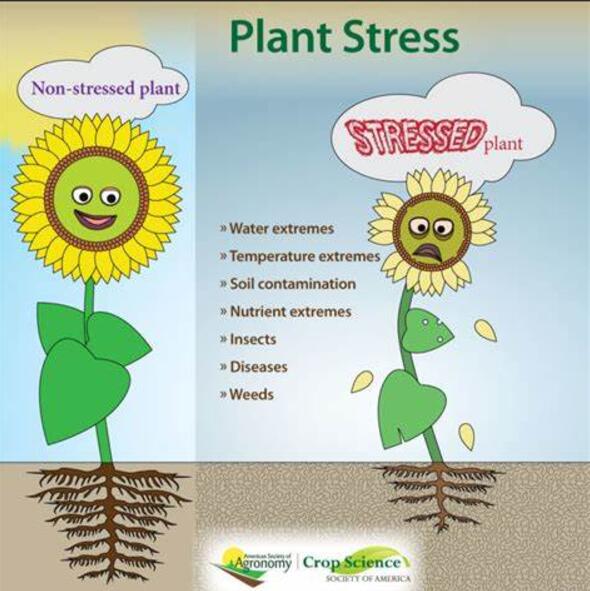Specific phytohormones levels in leaves and spikes of wheat explains the effects of elevated CO2 on drought stress at the flowering stage
IF 6.8
Q1 PLANT SCIENCES
引用次数: 0
Abstract
This study aims to understand the combined impact of elevated CO2 and drought stress at flowering stage to explain the adaptation of bread wheat to future climate change scenarios. Four wheat genotypes with 24 replications of each were grown in two different greenhouses, maintaining 400 (ambient) and 800 (elevated) ppm levels of CO2. Irrigation was withheld at flowering to impose drought to 10 replications while 10 were allowed to grow normally. Daily water consumption was recorded until the pot-water of drought plants reached 10 % of the well-watered ones. This study was aided by the measurement of ecophysiology, phytohormones, and yield-related traits. In comparison to normal CO2, plants consumed the pot water quickly under elevated CO2. Further, the threshold value of the fraction of transpirable soil water, at which the relative transpiration is diverging from 1 was different at the two levels of CO2, and among genotypes. Drought significantly reduced plant water relations, gas exchange parameters, grain yield, and yield-related traits but enhanced osmotic adjustment, kernel abortion, and most of the phytohormones in leaves and spikes. Elevated CO2 though increased gas exchange parameters significantly under well-watered conditions but these parameters were significantly reduced under combined effect with drought and resultantly, lower yield-related traits were recorded. Moreover, we also identified a strong positive association between leaf trans-zeatin and a strong negative association of leaf and spike ABA and ACC with grain yield indicating that maintenance of a higher level of leaf trans-zeatin or lower levels of ABA and ACC can help plants to adapt better to the combination of elevated CO2 and drought.
小麦叶片和穗中的特定植物激素水平解释了高浓度二氧化碳对开花期干旱胁迫的影响
本研究旨在了解高浓度二氧化碳和开花期干旱胁迫的综合影响,以解释面包小麦对未来气候变化情景的适应性。四种小麦基因型在两个不同的温室中生长,每个基因型有 24 个重复,分别保持 400 ppm(环境)和 800 ppm(升高)的二氧化碳水平。10个重复在开花时停止灌溉以施加干旱,10个重复正常生长。记录每天的耗水量,直到干旱植物的盆水达到浇水充足植物的 10%。生态生理学、植物激素和产量相关性状的测量为本研究提供了帮助。与正常 CO2 相比,植物在高浓度 CO2 条件下消耗盆水的速度更快。此外,在两种二氧化碳水平下,相对蒸腾量偏离 1 时的可蒸腾土壤水分阈值不同,不同基因型的阈值也不同。干旱明显降低了植物的水分关系、气体交换参数、谷物产量和产量相关性状,但增强了渗透调节、籽粒流产以及叶片和穗中的大部分植物激素。在水分充足的条件下,二氧化碳升高会显著增加气体交换参数,但在与干旱共同作用的条件下,这些参数会显著降低,从而导致产量相关性状降低。此外,我们还发现叶片反玉米素与谷物产量呈强正相关,而叶片和穗粒 ABA 和 ACC 与谷物产量呈强负相关,这表明保持较高水平的叶片反玉米素或较低水平的 ABA 和 ACC 能帮助植物更好地适应二氧化碳升高和干旱的共同作用。
本文章由计算机程序翻译,如有差异,请以英文原文为准。
求助全文
约1分钟内获得全文
求助全文
来源期刊

Plant Stress
PLANT SCIENCES-
CiteScore
5.20
自引率
8.00%
发文量
76
审稿时长
63 days
期刊介绍:
The journal Plant Stress deals with plant (or other photoautotrophs, such as algae, cyanobacteria and lichens) responses to abiotic and biotic stress factors that can result in limited growth and productivity. Such responses can be analyzed and described at a physiological, biochemical and molecular level. Experimental approaches/technologies aiming to improve growth and productivity with a potential for downstream validation under stress conditions will also be considered. Both fundamental and applied research manuscripts are welcome, provided that clear mechanistic hypotheses are made and descriptive approaches are avoided. In addition, high-quality review articles will also be considered, provided they follow a critical approach and stimulate thought for future research avenues.
Plant Stress welcomes high-quality manuscripts related (but not limited) to interactions between plants and:
Lack of water (drought) and excess (flooding),
Salinity stress,
Elevated temperature and/or low temperature (chilling and freezing),
Hypoxia and/or anoxia,
Mineral nutrient excess and/or deficiency,
Heavy metals and/or metalloids,
Plant priming (chemical, biological, physiological, nanomaterial, biostimulant) approaches for improved stress protection,
Viral, phytoplasma, bacterial and fungal plant-pathogen interactions.
The journal welcomes basic and applied research articles, as well as review articles and short communications. All submitted manuscripts will be subject to a thorough peer-reviewing process.
 求助内容:
求助内容: 应助结果提醒方式:
应助结果提醒方式:


